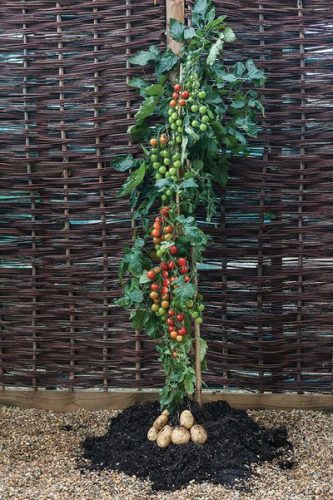
Potatoes and tomatoes on the same plant? Perhaps Stephen Colbert on The Colbert Report said it best by including this wacky concept in his segment: “That’s The Craziest F#?king Thing I’ve Ever Heard.”
The plant, named “Ketchup ‘N’ Fries,” can be traced to Log House Plants in Cottage Grove, a wholesale nursery that promotes grafted plants as a natural means to increase productivity and make gardening more accessible to all.
“It’s one of the few things that’s come through for farmers that uses traditional farming techniques but is more productive,” Alice Doyle of Log House Plants says about the technique of grafting.
A plant like Ketchup ‘N’ Fries might be crazy, but the technique used to make it is not. Grafting makes it possible to mix and match the top of the plant — the scion — and the bottom of the plant — the rootstock — opening up all sorts of possibilities. Usually, this technique is used to make heartier, more productive plants, like a tomato plant that combines pest resistance with tasty fruit.
“It’s a natural process, no GMOs,” Doyle says. “You don’t have to be worrying about chemical residues.”
Grafting is only beginning to take off in the U.S., but it is widely used across the globe as an eco-friendly way to increase yields and productivity. “In 2011, a billion vegetables were grafted in the world,” Doyle says. Log House Plants and its partner, SuperNatural Grafted Vegetables, secured a license from a Dutch company to sell Ketchup ‘N’ Fries in the U.S. for 2015.
Ketchup ‘N’ Fries can be grown in a 18-to-22-inch container, so any person who is short on space will appreciate it. “Even though it’s a gimmick, I wanted people who don’t usually garden to get excited about gardening,” Doyle says.
There is also the Pixie Grape, which Doyle calls “the world’s first dwarf grape.” Like Ketchup ‘N’ Fries, the Pixie Grape is perfect for container gardening and is derived from the grape used for champagne — imagine a mini-vineyard on your apartment patio.
Ketchup ‘N’ Fries, the Pixie Grape and other plants are available through Territorial Seeds, Garden America and other local retail nurseries.